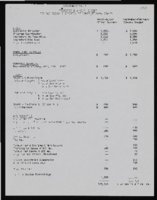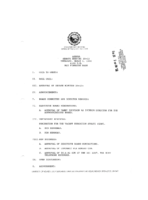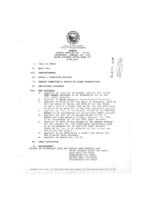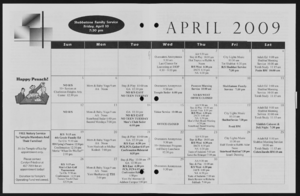Search the Special Collections and Archives Portal
Search Results

Deryk and Melissa Engelland oral history interview: transcript
Date
Archival Collection
Description
Oral history interview with Deryk and Melissa Engelland conducted by Barbara Tabach on May 23, 2019 for the Remembering 1 October Oral History Project.
Deryk Engelland is a professional hockey player and team spokesperson for the Vegas Golden Knights in Las Vegas. He and his wife, Melissa, discuss the events of the October 1 shooting and how the Golden Knights chose to honor the community that they were representing after this tragic event. Deryk and Melissa Engelland established the Vegas Born Foundation to honor first responders and community heroes, and the couple talks about the organization's accomplishments since its inception.
Subjects discussed include: Las Vegas healing.
Text

Meeting minutes for Consolidated Student Senate University of Nevada, Las Vegas, February 9, 1989
Date
Archival Collection
Description
Text

Economic Opportunity Board of Clark County (Nev.) financial and budget reports
Date
Archival Collection
Description
From the Clark County Economic Opportunity Board Records -- Series I. Administrative. This folder contains financial memos and reports of the Clark County Economic Opportunity Board from 1964 through 1965.
Text

Transcript of interview with Willie Jones, James Jones, and Jamet Jones by Robbin Mc Laurin, March 5, 1980
Date
Archival Collection
Description
On March 5, 1980, collector Robbin McLaurin interviews three members of the Jones family, Willie, James, and Jamet Jones (born 1923, 1920, and 1961, respectively) in the Jones home. Mr. and Mrs. Jones were born in Forest, Mississippi, and relocated to Las Vegas, Nevada, for employment related purposes. This interview covers Las Vegas, past and present.
Text

Transcript of interview with Dale Duane Everett by John Everett, March 7, 1980
Date
Archival Collection
Description
On March 7, 1980, John Everett interviewed his father, cab driver Dale Everett (born January 29, 1924 in Danville, Illinois) at their family home in Las Vegas, Nevada. This interview covers past local historical data. During the interview, Mr. Everett discusses the weather, wildlife, and hunting. He also shares his views on prostitution and gambling in Las Vegas.
Text

Benilda Long Somes oral history interview: transcript
Date
Archival Collection
Description
Oral history interview with Benilda Long Somes conducted by Vincent Long on November 29, 2021 for Reflections: The Las Vegas Asian American and Pacific Islander Oral History Project. Benilda discusses her life in Magalang, Philippines and her immigration to Saipan, part of the Northern Mariana Islands, as a young woman. She talks about meeting her partner, airman Robert Long, the birth of their son, and Robert's untimely death in an air crash less than a year later. Benilda shares how she and her child immigrated to the United States to be with family and their move to Las Vegas, Nevada in 2009.
Text

Meeting minutes for Consolidated Student Senate University of Nevada, Las Vegas, March 1, 1990
Date
Archival Collection
Description
Text

Meeting minutes for Consolidated Student Senate University of Nevada, Las Vegas, January 20, 1993
Date
Archival Collection
Description
Text


